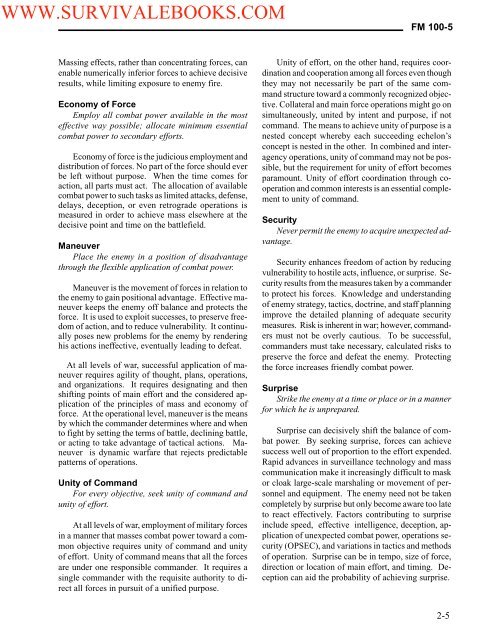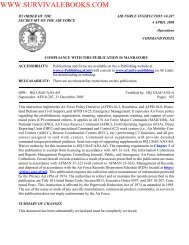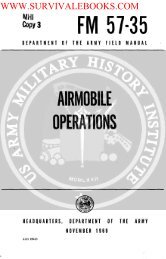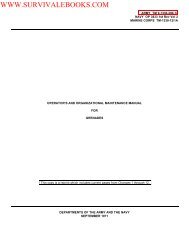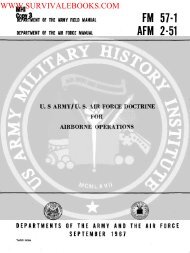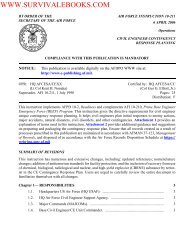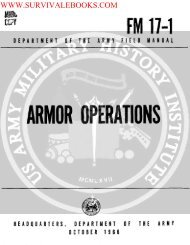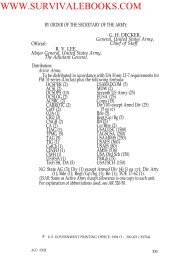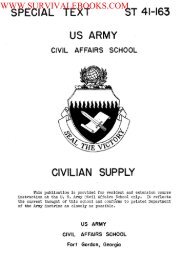FM 100-5 Operations - Survival Ebooks Military Manuals Survival ...
FM 100-5 Operations - Survival Ebooks Military Manuals Survival ...
FM 100-5 Operations - Survival Ebooks Military Manuals Survival ...
You also want an ePaper? Increase the reach of your titles
YUMPU automatically turns print PDFs into web optimized ePapers that Google loves.
WWW.SURVIVALEBOOKS.COM<strong>FM</strong> <strong>100</strong>-5Massing effects, rather than concentrating forces, canenable numerically inferior forces to achieve decisiveresults, while limiting exposure to enemy fire.Economy of ForceEmploy all combat power available in the mosteffective way possible; allocate minimum essentialcombat power to secondary efforts.Economy of force is the judicious employment anddistribution of forces. No part of the force should everbe left without purpose. When the time comes foraction, all parts must act. The allocation of availablecombat power to such tasks as limited attacks, defense,delays, deception, or even retrograde operations ismeasured in order to achieve mass elsewhere at thedecisive point and time on the battlefield.ManeuverPlace the enemy in a position of disadvantagethrough the flexible application of combat power.Maneuver is the movement of forces in relation tothe enemy to gain positional advantage. Effective maneuverkeeps the enemy off balance and protects theforce. It is used to exploit successes, to preserve freedomof action, and to reduce vulnerability. It continuallyposes new problems for the enemy by renderinghis actions ineffective, eventually leading to defeat.At all levels of war, successful application of maneuverrequires agility of thought, plans, operations,and organizations. It requires designating and thenshifting points of main effort and the considered applicationof the principles of mass and economy offorce. At the operational level, maneuver is the meansby which the commander determines where and whento fight by setting the terms of battle, declining battle,or acting to take advantage of tactical actions. Maneuveris dynamic warfare that rejects predictablepatterns of operations.Unity of CommandFor every objective, seek unity of command andunity of effort.At all levels of war, employment of military forcesin a manner that masses combat power toward a commonobjective requires unity of command and unityof effort. Unity of command means that all the forcesare under one responsible commander. It requires asingle commander with the requisite authority to directall forces in pursuit of a unified purpose.Unity of effort, on the other hand, requires coordinationand cooperation among all forces even thoughthey may not necessarily be part of the same commandstructure toward a commonly recognized objective.Collateral and main force operations might go onsimultaneously, united by intent and purpose, if notcommand. The means to achieve unity of purpose is anested concept whereby each succeeding echelon’sconcept is nested in the other. In combined and interagencyoperations, unity of command may not be possible,but the requirement for unity of effort becomesparamount. Unity of effort coordination through cooperationand common interests is an essential complementto unity of command.SecurityNever permit the enemy to acquire unexpected advantage.Security enhances freedom of action by reducingvulnerability to hostile acts, influence, or surprise. Securityresults from the measures taken by a commanderto protect his forces. Knowledge and understandingof enemy strategy, tactics, doctrine, and staff planningimprove the detailed planning of adequate securitymeasures. Risk is inherent in war; however, commandersmust not be overly cautious. To be successful,commanders must take necessary, calculated risks topreserve the force and defeat the enemy. Protectingthe force increases friendly combat power.SurpriseStrike the enemy at a time or place or in a mannerfor which he is unprepared.Surprise can decisively shift the balance of combatpower. By seeking surprise, forces can achievesuccess well out of proportion to the effort expended.Rapid advances in surveillance technology and masscommunication make it increasingly difficult to maskor cloak large-scale marshaling or movement of personneland equipment. The enemy need not be takencompletely by surprise but only become aware too lateto react effectively. Factors contributing to surpriseinclude speed, effective intelligence, deception, applicationof unexpected combat power, operations security(OPSEC), and variations in tactics and methodsof operation. Surprise can be in tempo, size of force,direction or location of main effort, and timing. Deceptioncan aid the probability of achieving surprise.2-5


